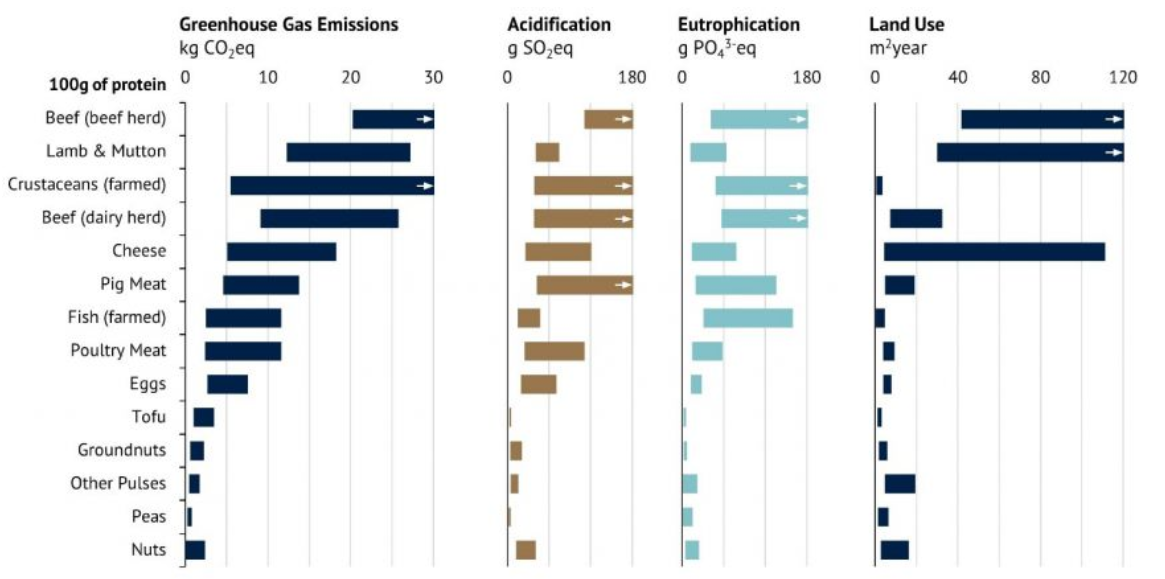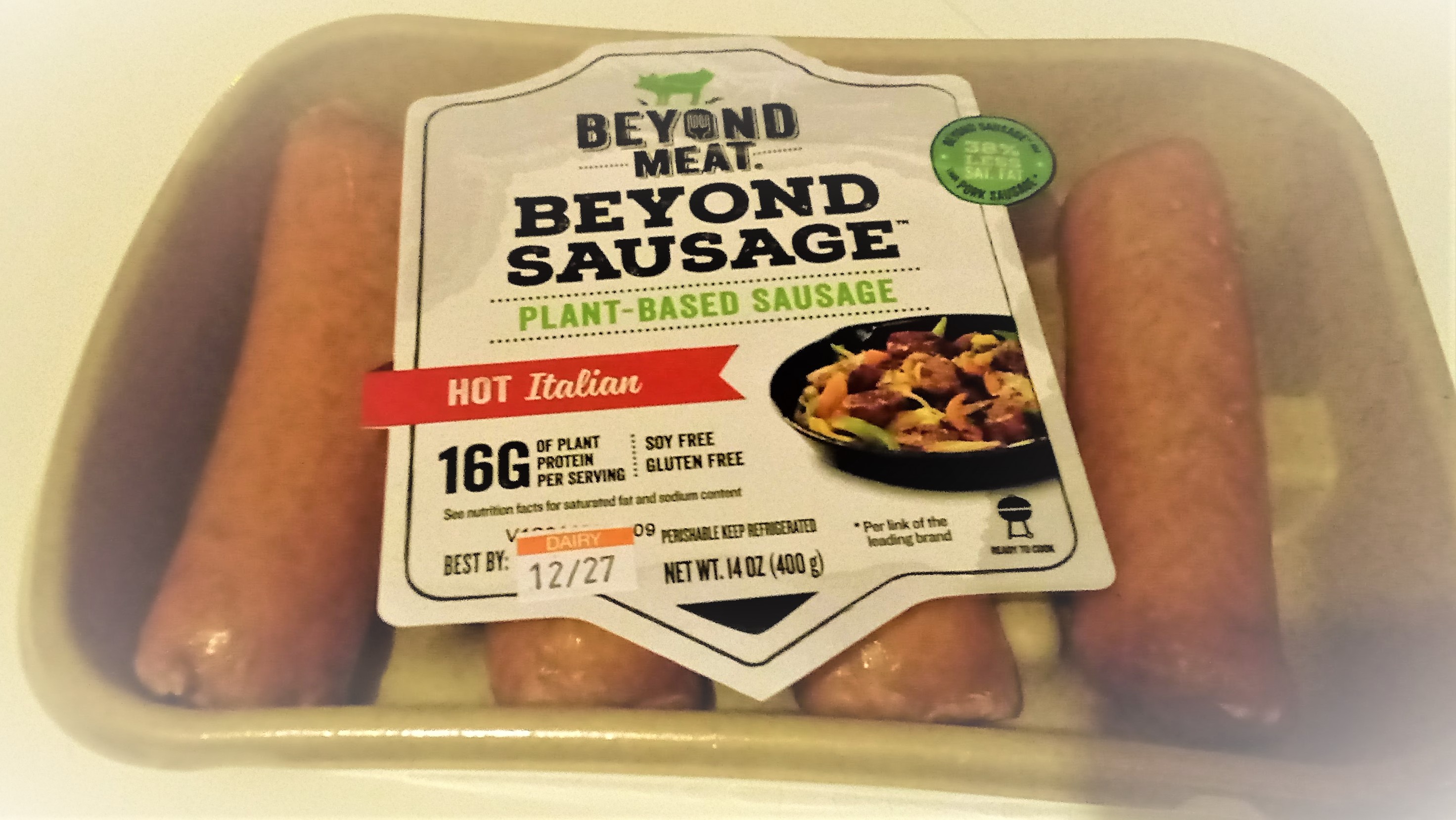Hi Folks! In a return to the Daily Footprint posts, I’m going to spend some time looking at plant-based meat substitutes. They are definitely catching on: last year, in the US, sales of meat rose by 2% while sales of plant-based meat-substitutes rose by 24% (and sales rose even faster than that in Europe). Over the course of just this one day, around 150 million land animals are being killed for human consumption. Many of us don’t want to be a part of this anymore. Beyond Meat has been making some of the biggest waves in the plant-based protein market, attracting investors such as Bill Gates and Leonardo DiCaprio. For an overview of the company here’s a great interview with Beyond Meat founder, Ethan Brown, on Plant Based News:
Sustainability of Beyond Meat
Researchers at the University of Michigan carried out a comprehensive Life Cycle Assessment (LCA), comparing a Beyond Meat burger to a beef burger. The impact of the plant-based burger is impressively lower: around 10-fold reductions in greenhouse gas (GHG) emissions and land use, and a 200-fold reduction in water use.

The main ingredients in the Beyond Meat products are pea protein, canola oil and coconut oil. The first two are mainly grown in Canada and the US and the coconuts are grown in Malaysia and Indonesia. I’ve written about the impact of coconut oil before and consider it an ethical product when sourced well (e.g., Nutiva coconut oil gets 5/5 Green Stars). Note that coconuts don’t compete for rainforest land, as palm oil does. Let’s take a closer look at peas…
Peas are far more sustainable than meat
Just to further clarify the comparison between legumes (peas, soybeans, lentils, peanuts) and meat, here’s data from an Oxford University study, published in 2018 in Science. The table for Beyond Meat (above) looks at the impact of the entire final product, including all ingredients, processing and packaging. If you just look at this straight comparison between beef and peas (below) you can see that the reduction in GHG emissions and land use are even more impressive. There’s also a massive reduction in stress on soil and water systems (acidification and eutrophication). So I’m sure you’ve heard it before, but eating your peas, beans, nuts and tofu are all excellent ways to do your part in healing this planet.

Sustainable Packaging
The researchers from the University of Michigan also looked at the packaging for Beyond Meat burger patties, and one recommendation for improvement was to make the tray from post-consumer recycled polypropylene. Packaging for their sausages is significantly better, comprising a cardboard tray covered with a layer of thin polyethylene film with a label attached. Actually, this was one of the first things that caught my attention in the store: it’s a nice example of minimal packaging. Consumers in the US seem to be a bit paranoid about their packaging, preferring products to come in layers of reinforced plastic rather than something more sustainable. Beyond (and other brands like Quorn, which I’ll feature in upcoming posts) deserve recognition for bucking that horrible trend (at least with their sausages).

Pea protein takes off.
Making plant-based alternatives from pea protein is really taking off these days. In a post on plant-based milks, I’ve looked into Ripple milk, also pea-based. Like Ripple, Beyond has raised the bar when it comes to plant-based alternatives. In both cases, the ingredients are not organic, but both companies have expressed interest in using organic ingredients in future. For both companies, there are still a few areas for improvement as far as social and environmental impact goes.
Room for improvement: agriculture and trade practices
Since peas (like all legumes) have the wonderful agricultural advantage that they fix their own nitrogen, it’s not entirely clear that there’s a benefit switching to certified organic. That’s because organic certification puts restrictions on the kinds of fertilizer that can be used, which can make it complicated to treat legumes that usually need potassium and phosphorous more than nitrogen. So, although I’m usually in favor of organic products (and I do follow the pro and con arguments in the science literature) I would say that for legumes, I’m not always looking for organic certification but would like see evidence that sustainable farming practices are used.
So, it would be great to see Beyond Meat (and Ripple Foods) providing information on how the peas are farmed and using their leverage to encourage suppliers to use Integrated Pest Management and minimize pesticide usage. It would also be nice to see Beyond Meat moving towards adoption of organic coconut and canola oils. Perhaps the last major factor that Beyond could look at to seal the deal on a completely ethical product is to use fair trade coconut oil, or in other ways show that their supply chain in Malaysia and Indonesia is as ethical as possible.

Overall scores for quality and ethics
As far as quality goes, I wholeheartedly recommend the Beyond Meat sausages. As someone who hasn’t eaten a meat-based sausage in a few decades, I can say that these chaps brought back fond memories (without causing suffering). They have amazing flavor and texture that’s quite unlike any soy- or gluten-based products that I’ve eaten. The main downside is the price – they are not cheap compared to other veggie dogs – but as a monthly treat I think they are worth it. So 5/5 gold stars for quality. Perhaps 4/5 if you weigh the price heavily into your consideration.
For social and environmental impact, I’m awarding them 5/5 Green Stars. As listed above, there are still some improvements that could be made in the supply chain, and I look forward to seeing if they can make these happen. At the very least, I hope that they can maintain the standards that they already have set, after the company goes public.

We love the patties and the sausage and use them all the time.
LikeLiked by 3 people
Hey Cindy! Nice to hear. I’ve yet to try the burgers but will probably do so soon 🙂
Do they come in simple cardboard trays where you buy them too?
LikeLike
The packaging looks quite compostable.. which is nice to see as the company has received some criticism for the plastic packaging of its burgers.
LikeLike
Wow! Thank you for sharing such an informative post.
LikeLiked by 1 person
Thank you! It’s nice to meet a fellow biologist. I bet you would write a good Green Stars review if you were so inclined!
LikeLiked by 1 person
My pleasure! The feeling is mutual: it’s indeed exciting meeting a fellow biologist. Hey I’d love to write a review, thanks for the offer! Is this the correct post to follow for guidelines? https://greenstarsproject.org/2019/01/26/competition-write-an-ethical-review-online/
LikeLiked by 1 person
That would be wonderful – please do! And let me know if you need any help with it. I’m always happy to assist.
Yes, that’s the correct post. The competition repeats on an ongoing basis, so just let me know anytime you write a review.
Chances of winning are high 😉
LikeLiked by 1 person
Great, thank you! ✌🏼
Haha, that’s good news! 😉
LikeLiked by 1 person
Cool – good luck with it!
LikeLiked by 1 person
Thank you! 😊
LikeLiked by 1 person
What a great post. I love the way you’ve looked at each component of this product. Excellent work.
LikeLiked by 1 person
Thanks Elaine! I love your very comprehensive posts too! Can you get Beyond Meat in Ireland yet? If not, I think it’s coming soon.
LikeLike
So, these are wheat free? Do they actually taste like meat (you touched on this a bit) but I haven’t tried them yet. I am under the impression that it would be a little disconcerting..<–been vegetarian since 1992. lol
LikeLiked by 1 person
They actually are wheat (and gluten) free. Product details can be found here. I haven’t eaten meat since around the same time as you – except twice when restaurant orders were mixed up and my burger wasn’t veggie (and neither of those times was a pleasant experience). So, I’d say that the sausages have a really nice kind of umami flavor – like a richly flavored dish made from mushrooms or well-flavored beans/lentils. Impossible Foods have made such a fuss over their leghaemoglobin, but I’ve no great desire to eat something that mimics blood – quite the opposite!
LikeLiked by 1 person
It’s so terrible when they mess up the order–because then you’ve been complicit in the death of an animal, and for nothing because the food goes to waste. But on a brighter note, I love mushrooms, so I’ll give the sausages a try! One of the mushroom vendors at the farmer’s market has this incredible vegan mushroom soup that I get every month when I go shopping! Yes, that’s exactly what I was thinking of…that addition/food stuff that mimics blood. *shivers* Eek! LOL To me, that says you may as well just go ahead and order a burger.
LikeLike
A terrific post and great news all round.
LikeLiked by 1 person
Thanks Brigid! Love your recent posts – now I really want to visit Donegal on a future visit home!
LikeLiked by 1 person
Thank you. If you do, let me know and it would be nice to meet up.
LikeLiked by 1 person
I certainly will – thank you!
LikeLiked by 1 person
Very interesting! I would like to try these burgers and sausages. They sound (and look) delicious! I enjoy the idea of pea protein. I can tell you that my most favorite milk is cashew and almond milk with pea protein. I absolutely love it! The flavor is wonderful. I’ve not had cow’s milk in a very long time because of it. Cooking with it is fabulous too!
Thanks for sharing these food products with us. I’ll be on the look out here! ♥
LikeLiked by 1 person
Thanks Holly! Do you make the milk yourself or is it a commercial brand? Sounds like a good combination. I do like the flavor of Ripple milk too (which is pea protein).
LikeLiked by 1 person
I have made hemp and almond milk myself before. The hemp milk turned out quite delicious! 🙂
I do buy the almond cashew milk with pea protein though. It’s made by Silk. The area I live in is very rural so we have extremely limited options when it comes to many things. Silk is the only brand I’ve seen in these nut milks. Hadn’t heard of Ripple but sounds interesting!
LikeLiked by 1 person
I’ve never reviewed Silk – would be good to do so. Or would you like to? 🙂
I must try making hemp milk at home! Thanks!
LikeLiked by 1 person
I’d love to read a review you’ve done on Silk. Would be interesting 🙂
I think you’d enjoy hemp milk a lot. With a small amount of vanilla extract, the thick drink is delicious! ♥
LikeLiked by 1 person
An informative post, as always, JK. I buy veggie patties at my local Indian shop.
LikeLiked by 1 person
Thank you, Rosaliene 🙂
Sounds like a good plan – burgers with Indian spices can be really good! Trader Joe’s used to (or maybe still do) sell veggie masala burgers that were quite good.
LikeLiked by 1 person
Please sign the petition to get Beyond Meat to stop using so much plastic packaging! Cut and paste into your browser to go to Change.org
http://chng.it/wXt8G5zP
LikeLike
No gluten, YEAHHHHHHH
LikeLike